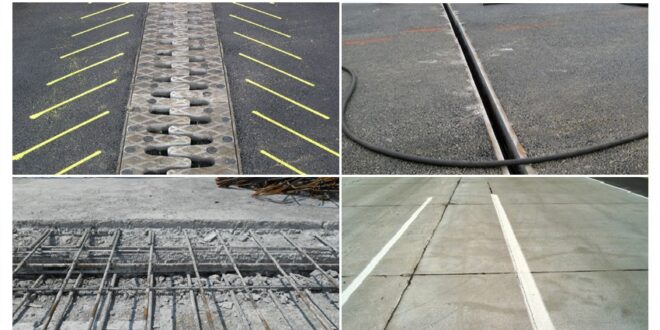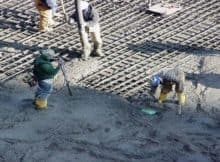What Is Slump Test?
Slump test is the most common, easy, and simple test used to measure the workability of fresh concrete. This test is performed to check the workability or consistency of freshly mixed concrete in a specific batch.
Workability means how easily the concrete can be mixed, handled, transported, placed in position, and compacted.
There are two other tests used to measure the workability of concrete; Compaction factor test and Vee-Bee test. Slump test is also known as slump cone test as a cone is used in the test.
This test is done at construction site before the concreting process. The slump test gives satisfactory results for the concrete mix of medium to high workability and unfortunately, it does not give the correct indication of low workability, which may give zero slumps.
Apparatus For Slump Cone Test:
1. Mould or slump cone with a height of 300 mm, bottom diameter 200 mm, and top diameter 100 mm.
2. Standard tamping rod.
3. Non-porous base plate.
4. Measuring scale.
Procedure Of Slump Test (Step By Step):
1. First, clean the inner surface of the empty mould and then apply oil to it.
2. Set the mould on a horizontal non-porous and non-absorbent base plate.
3. Fill the mould fully by pouring freshly mixed concrete into three equal layers.
4. Stroke each layer 25 times with the standard tamping rod over the cross-section.
5. After stroking 25 times the top layer is struck off level, now lift the mould slowly in the vertical direction without disturbing the concrete cone.
6. Use the measuring scale to measure the difference level between the height of the mould and the concrete sample.
7. The subsidence of concrete is known as the slump and the value of slump is measured in mm.
Types of Slump:
True Slump: The concrete mass after the test when slumps evenly all around without disintegration is called the true slump.

Shear Slump: When one-half of the concrete mass slide down the other is called the shear slump. This type of slump is obtained in a lean concrete mix.

Collapse Slump: When the sample is collapsed due to adding excessive water, it is known as collapse slump.
Zero Slump: For very stiff or dry mixes it does not show any changes in the slump after removing the slump cone.

Advantages Of Slump Test:
1. The procedure of slump test is simple and easy than any other workability test.
2. It requires inexpensive and portable apparatus.
3. Slump test can be performed at the construction site as well as in the laboratory.
Limitations Of Slump Test:
1. This test is limited to concretes with the maximum size of aggregate less than 38 mm.
2. The test is suitable only for concretes of medium or high workabilities (i.e having slump values of 25 mm to 125 mm).
3. For very stiff mixes having zero slumps, the slump test does not show any difference in concretes of different workabilities.
Recommended Values Of Slumps For Different Concrete Mixes:
| Types Of Concrete | Slump Range In mm |
| 1. Heavy mass construction | 25-50 |
| 2. Pavements | 20-30 |
| 3. Bridge deck | 25-75 |
| 4. Beams and slabs | 50-100 |
| 5. Columns, retaining walls and thin vertical members, etc. | 75-150 |
| 6. Vibrated concrete | 12-25 |
Also Read –
California Bearing Ratio Test – CBR Test
Plate Load Test – Procedure & Advantages
Field Density Test Of Soil – Sand Cone Method
Civil Engineering Interview Questions And Answers.
If you like this article then please share it with your friends & also like our Facebook Page and join our Telegram Channel.
“Happy Learning”







Good
Slab steel type. Bandap bar.
10 mm
12. mm
IS code method of mix design
How to calculate compressive strength test of cube 3 days /7days/28 days of diffrent grade of mixing concrete
If a slump test is not taken on site, but it passes the compression test….can a client reject the concrete pour?
I am following your daily posts it is so interesting,, I am upgrading my knowledge a lot , if it is possible please try to share us also the knowledge regarding to Highway,, keep it up! Thanks.
How to measure flow test of concrete?
If slump test report clear but compression test failed then claint comment…. may be
Very important for working professional we can gain knowledge and upgrade himself as because if some one belongs to highway . unpractised concrete work.so as per my experience it’s a good platform for working professional.